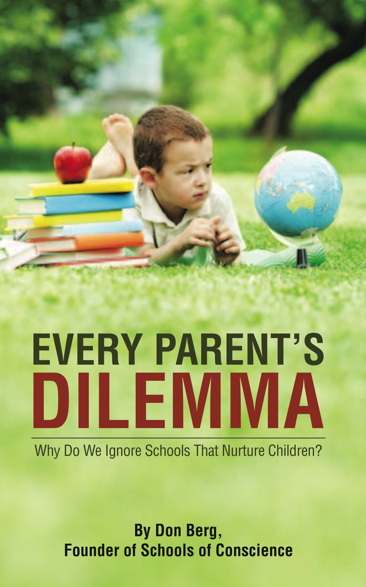A Nurturing Educational Policy to Solve Every Parent's Dilemma
Policy Creates Every Parent's Dilemma
Parents naturally want to put their children into schools that are familiar to them, but the familiar schools will diminish learning by failing to nurture their children.
Familiar schools versus nurturing schools, these are the horns of the dilemma that typical mainstream parents are put on by the fact that 30 years of solid scientific studies show that mainstream schools fail to nurture their students (where nurturing consists of supporting them to meet their primary human needs).
The foundation for effective and efficient learning is well-being, both physiological and psychological.
Yet, existing policies fail to acknowledge these foundations of good learning, let alone require systemic support for students and teachers to meet the primary human needs that produce well-being.
The talk below illustrates the challenge more graphically.
Bad News
Children's psychological well-being in mainstream K-12 schools consistently diminishes, thus creating the dilemma all parents face, even when they do not realize it.
Good News
Children's psychological well-being is supported in K-12 schools that facilitate self-directed learning.
Silver Lining
The good news can transform the bad news if well-being is given top priority.

Why do K-12 schools that facilitate self-directed learning serve less than 5% of all students in the USA despite over 100 years of good results?
The systematic growth of school models that support self-directed learning has been stunted by hidden barriers.
The hidden barriers also prevent more mainstream schools from sustainably adapting their practices to become more nurturing.
The barriers are based on a theory of education that is wrong.
K-12 educational policy makers at every level can remove those barriers by making an explicit commitment to ensuring that the schools they oversee support well- being.
Every Parent's Dilemma presents following educational policy resolution which you can take to your favorite policy makers to advocate for the well-being of all students.
Buy the book: Every Parent's Dilemma
Educational Policy Resolution to
Build on Well-Being to Achieve K-12 Equity
Government version 1.1 (31March2015)
Whereas, …
… all adults responsible for children must nurture them.
… nurturing in this resolution just means supporting a person (of any age) to satisfy their primary human needs.
… people whose primary human needs are being thwarted are less able to support others to satisfy their primary human needs. (For this reason on an airplane in an emergency, parents are advised to put on their oxygen mask first before putting one on their children.)
… collectively we fulfill our responsibilities, including the responsibility to nurture children, through organizations including, families, schools, governments, businesses, and civil society (non-profits, churches, and other service organizations).
… air, water, food, shelter, sleep, relatedness, autonomy, and competence have been shown to be primary needs (as established by peer-reviewed scientific studies published in widely respected journals).
… primary human needs are not derived from any other needs, are universal to all humans, and have non-neutral effects on well-being.
(… "Maslow's Hierarchy," despite being intuitively compelling and gaining widespread fame, has failed to receive scientific support.)
… thwarting the needs for relatedness, autonomy, and competence lead to anxiety, depression, and other forms of psychological distress.
… anxiety, depression, and other forms of psychological distress are forms of mental ill-being.
… ill-being, whether physical or mental, leads to diminished capacity for learning.
… supporting people to meet their needs for relatedness, autonomy, and competence leads to intrinsic motivation and engagement.
… intrinsic motivation and engagement lead to optimal learning and the best possible learning outcomes.
… peer-reviewed scientific studies of student populations published in widely respected journals have observed the maintenance of intrinsic motivation and engagement only in schools that make instruction and academic testing optional, not mandatory.
Therefore, we RESOLVE… to
… recognize that nurturing is the fundamental foundation for both well-being and education.
… recognize that nurturing is a pervasive responsibility of all adults in schools that serve children of any age.
… recognize that both adults and children must be nurtured in order for our schools to be effective and efficient educational organizations.
… require all schools to support nurturing as the fundamental foundation for optimal learning as a logical precedent to all the various purposes of education that the optimal learning will serve, the pedagogical choices that follow from those purposes, and the implementation of those pedagogical choices in schools.
… safeguard nurturing by requiring all schools to give it precedence over the pursuit of other valuable educational goals, such as possessing basic knowledge and skills, job readiness, and college preparation.
… require all schools to assess school climate at least twice per year using an instrument that includes measures of psychological well-being and that has been validated through peer-reviewed scientific research, (e.g. the Hope Survey).
… accord protections to any features of schools that can be shown to be causally related to nurturing and/or the maintenance of intrinsic motivation or engagement.
… respect and both financially and materially support schools that make instruction an optional feature of schooling by exempting them from requirements for instructional standardization and academic testing contingent on a pattern of school climate data demonstrating that their student population maintains intrinsic motivation or engagement for typical classroom activities.